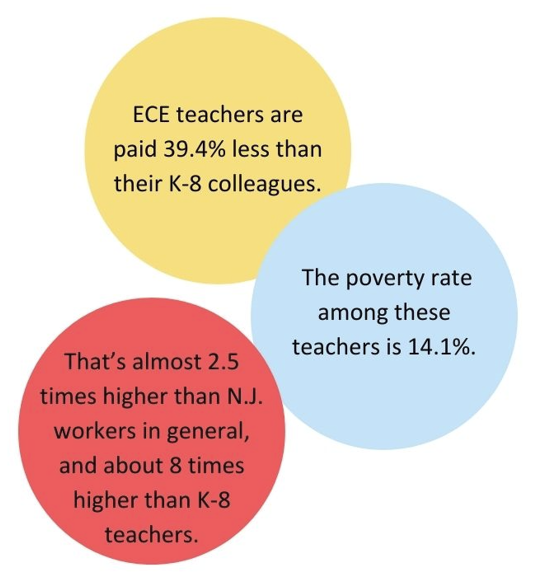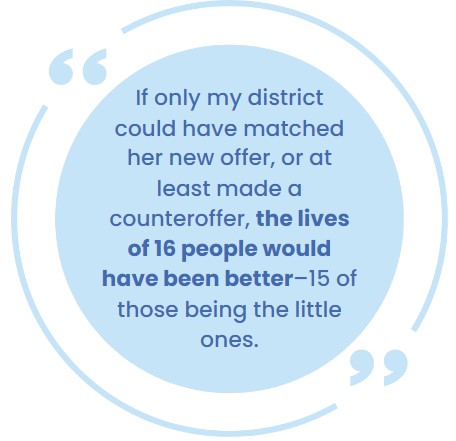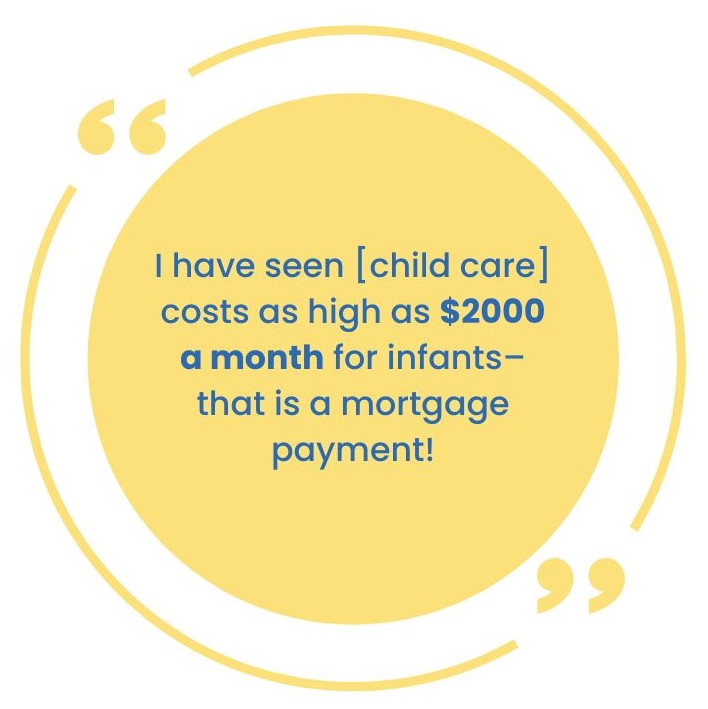Posted on March 20, 2024

By Robyn E. Koenig
Pre-K Teacher
Acelero Learning, North Brunswick School District
Robyn works with children ages 3 to 5. She holds a Master's in Mathematics and Reading from Walden University, and a Bachelor's in ECE from Kean University.
To hear more about Robyn's experiences in the field of ECE, contact her at rkoenig@acelero.net.

As a pre-K teacher for over 26 years, I’d like to share my thoughts on how teachers have been treated and some of the things we have been through over the past few years. Teaching is a calling and not everyone can do it. Many people feel early childhood education (ECE) is all play and fun. No one knows about the paperwork and observations that go into helping 3- to 5-year-olds. Many times, ECE teachers are overlooked. Quite recently, I began to assist my place of employment with an advocacy position to help teachers be heard on a very important issue: their salary.
ECE teachers in N.J. are paid based on multiple factors such as their schooling, their experience, and where they teach. Many times, it is not consistent and varies, even within companies. For example, ECE teachers are paid 39.4% less than their K-8 colleagues. The poverty rate among these teachers is 14.1%, much higher than N.J. workers in general (5.8%), and almost 8 times higher than K-8 teachers (1.8%). I have personally seen teachers, myself included, struggle financially, which causes stress and depression. Living paycheck to paycheck with a family of four is not easy, especially if you are the breadwinner.

Many teachers choose to leave positions due to pay–not because they want to, but because they must go where the money will better help their families. I have personally experienced this recently, in December of 2023, when my Teacher Assistant (TA) left to another school district. Why did she leave? For more pay and better benefits. These situations cause many different emotions in the classrooms of pre-K students. Of course, they don’t understand money like adults (not that I told them why she left). It is currently March 2024 and the children still ask for her and tell me they miss her. My current TA is awesome but because she is new, the entire class has reverted to its September behavior. With me being the only constant and my new TA still learning the ropes, it puts more pressure on me in the classroom– all because the pay wasn’t good enough for my previous TA to stay.

If only my district could have matched her new offer, or at least made a counteroffer, the lives of 16 people would have been better–15 of those being the little ones. I’m not trying to sound selfish but working with ECE... it’s a big job. Being the foundation for children’s entire school career is a responsibility that comes with much pressure. The smoother the classroom runs, the better the experience for everyone. If teachers or TAs leave during the middle of the year, everyone else needs to pivot and change gears to make sure to the best of their ability that the smoothness continues.
During the pandemic, from March 2020 to June 2020, teachers were praised for their jobs. After that, they were ridiculed because of changes that were made. Most times, teachers have no say in what happens in their classroom, but the general public doesn’t know that. Also, because of the pandemic, many schools lost teachers. They left for various reasons: fear of getting sick, being fed up with the ridicule, the pay and benefits, and the biggest reason I’m aware of, was simply to stay home because they could not find child care for their own children since teachers in ECE had left in droves.
Child care is a big industry, not only in N.J. but across the country. Many people need to go to work, and with children, child care is a necessity. However, many families struggle to pay for it. I have seen costs as high as $2000 a month for infants–that is a mortgage payment! Many people also live in “child care deserts,” which are areas where there are not enough child care spaces for the number of children in the community. This forces people to look at their finances and consider whether it is more feasible for one parent to stay at home with the child(ren), or to continue working. But how many people work to pay for child care? I am sure that number is high.

It is an evil circle: the teachers need to get paid a livable wage and not suffer financially, but centers need to charge their clients more to make that happen. If more subsidies were available to more families, that would be a game changer. With more financial help, families would have the opportunity to continue working, or finally return to work, while being able to provide their children access to the strong foundation of early learning that is crucial for them.
ECE teachers are a great asset to their communities and without them, the future of tomorrow’s children would be quite bleak. I hope my Senators and Representatives of N.J. see this article, understand the very real issues that exist in the field, and make decisions in support of ECE to make N.J. better for all–staff, teachers, parents, and especially children. Together, we can make a difference as we work towards building the best foundation for our children and their families. Together, with a sustainable system in place for ECE, we can solidify the future of not just N.J., but of the entire country!
Please support early childhood education!

